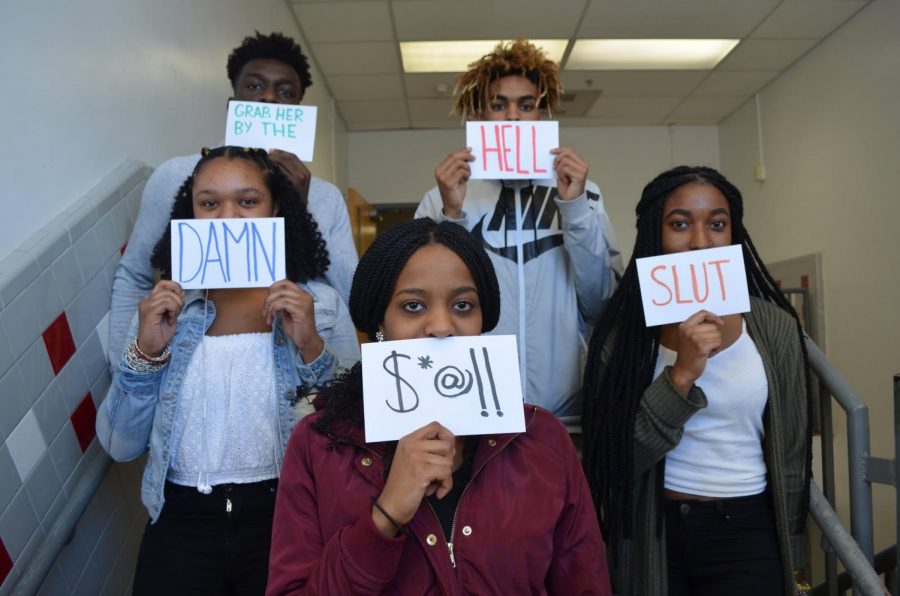Shut the front door
Has language devolved in the 21st century? Are we getting more coarse in our use of speech?
As senior Megan Lee rushes from one side of the school to the other, she hears other students shout and yell expletives such as “F off!” or “Hey B!” at each other. She stops walking and shakes her head, before hurrying off to class again. Lee, who went to private school for nine years, is shocked by these outbursts, even after four years at AHS.
“I think the extremely small ration between teachers and students is what kept cursing so low at private school. I was never in an area where teacher supervision wasn’t present,” said Lee. “Etiquette was also an extremely valued principle at our school and was practiced as much as every other academic class.”
To confirm Lee’s observations, The A-Blast placed four reporters around the school during the class exchange between R1 and R3 on Friday, Feb. 9, Placed in in the upstairs language hall, downstairs science hall, jock lobby and cafeteria, they were instructed to mark down each time they heard any sort of obscenity. The reporters found 22 cases of cursing, with words ranging from “damn” to the f-word within the eight-minute period.
This wasn’t a one-time phenomenon and doesn’t only happen when the bell rings. Cursing is heard throughout the day at lunch, club meetings and even in class.
Teenagers are taking what was once deemed inappropriate even in private settings and now using it in every aspect of their lives. Swear words have taken up the role of fillers in students’ daily vocabulary, becoming more frequent in their everyday conversation.
“I think that when you are an adolescent, you’re very aware of the people around you,” School Phycologist Dr. Anne Brosnan said. “There’s a lot of pressure on kids to fit in and to be part of the bigger group and they can behave and do things that they think is going to make them better liked or better accepted by other kids.”
Autotech and engineering teacher Phil Harris has been at AHS for 19 years and recognizes the shifted dynamic in teenage vocabulary.
“I try to do the same thing that I have always done and reprimand them for using that language,” Harris said. “But now it is more frequent in the classroom, hallways, practices and it bothers me because that language is not used to respect elders.”
Language itself evolves with the culture, values, beliefs and symbols of society. Teenagers of every generation have altered language to what they value or deem as in or out of style. Knowing the latest slang or hip word has always been an integral piece of the teenage experience.
Teenagers are not only exposed to profanity in popular culture, but also by news and adults.
“There are definitely times when I turn on the news and there are just swear words spread across the screen,” senior Betel Eyob said.
Even the President has been heard, on numerous occasions, to throw out profanity. In 2005, Donald Trump was recorded saying that because of his status, he can “grab them [women] by the p****.”
More recently, President Trump allegedly referred to immigrants from African nations as “people from sh*thole countries” during a meeting. After his State of the Union speech, Trump claimed that the Democrats who did not stand for him committed acts of treason. The President did not provide the correct and legal standard for treason, giving this word, a new meaning.
“I feel like because how public it is, kids will look up to people of higher position and repeat after them,” Eyob said.
The words of the President cannot be censored and hidden away. They are published as headlines across the world and forever preserved as part of his records while in office.
The A-Blast, along with professional media outlets, usually refrains from publishing profanity. However, due to the position of government officials and their role in society, it becomes proper and a duty for the press to report them to the public.
When authority figures such as the President and parents regularize swearing, they set an example for adolescents to follow. Words become corrosive and lose their original meaning. This blurs the line between teenagers knowing when they are permitted to curse and when it is inappropriate to do so.
In some families, parents are more relaxed about swearing. Other families prohibit cursing completely.
“I never curse with my parents and only do it within my friend circle,” senior Ingrid Guardado said. “But I know that there are people who freely swear at home because their families simply don’t care anymore. It’s become really normal now for some.”
Not only is cursing normalized, but also the casual use of racial slurs.
“People who aren’t black should not use the n-word because it is a derogatory term,” senior Samuel Wondwossen said. “Using it is ignoring the country’s history of slavery.”
In today’s increasingly technology-based world, the young adults of the 21st century are also influenced by new types of unregulated media sources that are scattered with curse words. Although the internet has broadened the accessibility of information, the web is also a place for uncensored and obscene content.
Through social media platforms and video sites, kids have entry to a world of expletives. The modern move away from television and radio means that they can watch and read thousands of videos and messages whose language is regulated by the media companies themselves and not by the Federal Communications Commission (FCC).
Since obscenity and indecency are not protected under the freedom of speech listed in the First Amendment, the FCC decides and filters out the profanity on television and radio. Today, enforcement from the federal government has lost its previous value as current generations increase its dependence on finding entertainment on the Internet.
“YouTubers do and say crazy things for attention and views now, there is practically a curse word in every video,” Guardado said. “I think that we are also influenced by the music that we are listening to, which is definitely different from the sounds of previous generations.”
After repetitive use, profanity, as with any other type of word, gains a different level of power.
“We as a society decides what is appropriate,” Brosnan said. “The words that we consider curse words are words that we as a society have decided are bad words. Really, words are just words.”
Even though language is fluid and cursing may be just another generational hype, it is worth recognizing the influences that have contributed to this shift.
“I wasn’t taught to use cursing as an outlet and it never really occurred to me or my peers to ever use profanity at school, let alone in our daily lives,” Lee said.
For people like Lee, even though it is difficult for them to understand the purpose of casual cursing, have learned to ignore it and not allow themselves to become offended by it.

Senior Binqi Chen is the current Co Editor-in-Chief of The A-Blast. She has been on staff for four years and previously served as the In-Depth Editor as...












